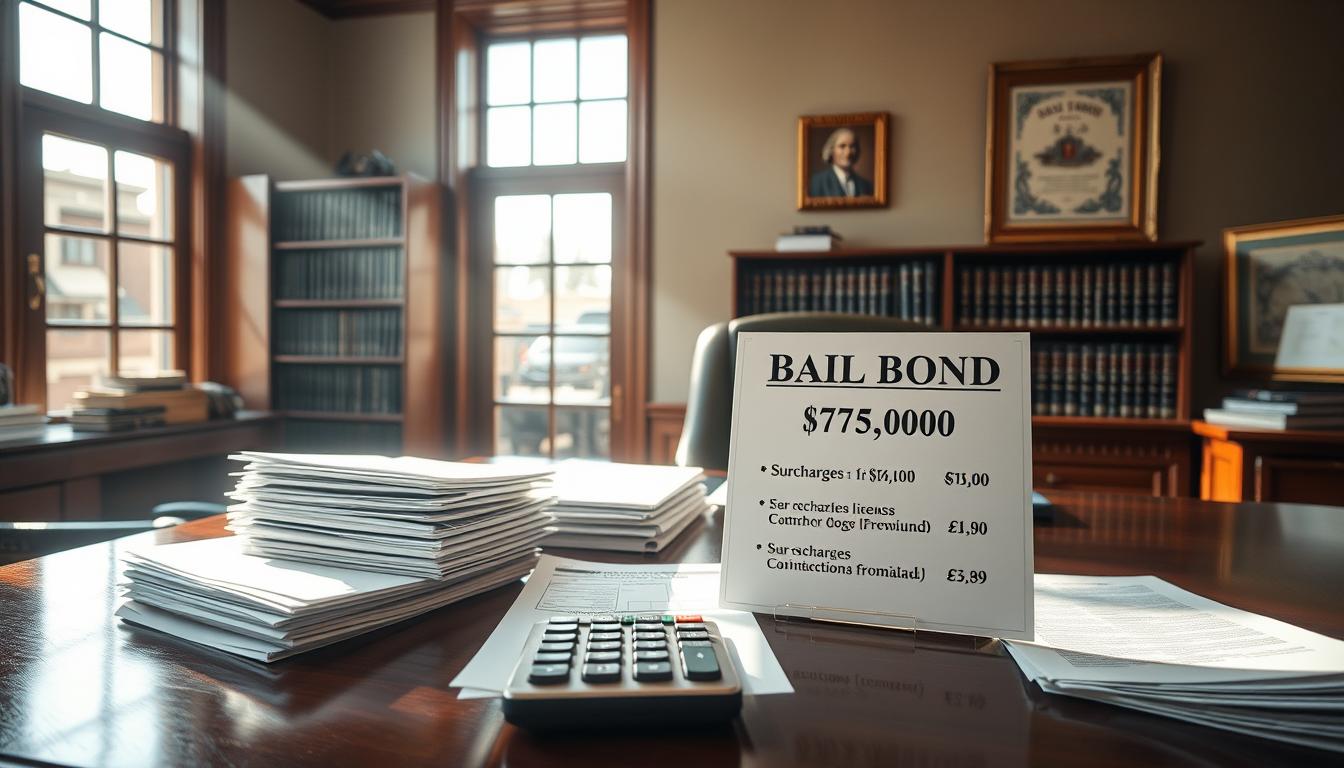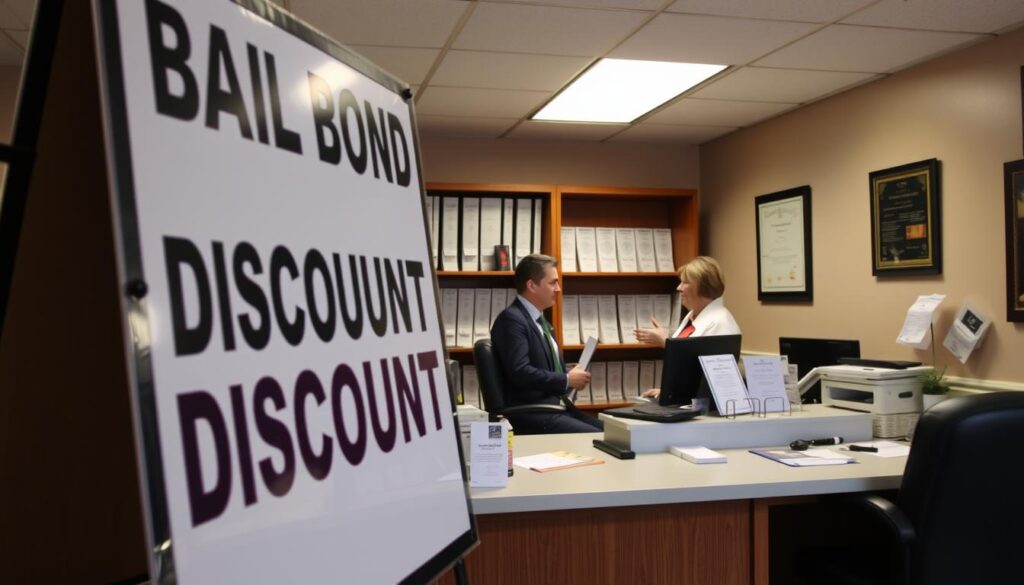
18 Feb How Much Does a $75,000 Bail Cost?
Bail costs can vary a lot. Knowing the basics is key when facing a $75,000 bail. Bail bond fees usually range from 7% to 10% of the total bail. So, for a $75,000 bail, the cost could be between $5,250 and $7,500.
In California, bail bond fees are often 10% of the total bail amount. This is set by the California Department of Insurance. But, some bail bond companies might offer lower rates to certain clients.
Bail amounts depend on the crime’s severity. For example, felony domestic violence bail in Los Angeles and Orange County was $50,000 in 2012. Less serious crimes in California usually have bail from $20,000 to $50,000.
Many things can affect bail amounts. These include the defendant’s criminal record, job status, and ties to the community. Each county in California has its own bail schedule. Judges review and adjust these schedules often. The initial bail amount set by arresting officers is usually temporary until the first court hearing.
Key Takeaways
- Bail bond fees typically range from 7% to 10% of the total bail amount
- For a $75,000 bail, the cost could be between $5,250 and $7,500
- California mandates a 10% bail bond fee, but some companies offer discounts
- Bail amounts vary based on offense severity and individual factors
- County-specific bail schedules are reviewed and adjusted periodically
Understanding Bail Bond Costs and Percentages
Bail pricing can be complex. Bail bondsman rates change based on several factors. The cost of getting out of jail through bail bond services is usually 7% to 10% of the total bail amount. This fee is non-refundable and charged by bail bond agents for their services.
Standard Industry Rates
In most states, including California, the maximum legal rate for bail bond services is 10% of the bail amount. Some companies offer lower rates, like 7%, to attract clients. For example, if bail is set at $10,000, a standard 10% fee would be $1,000. A discounted 7% rate would result in a $700 charge.
Premium Rate Variations
Bail bond rates can change based on several factors. These include the defendant’s criminal history, flight risk, and credit score. Some agencies offer special discounts for military personnel, union members, or AARP members. It’s important to compare rates from different bail bond services to find the best deal.
Calculating the Basic Fee Structure
To calculate the basic fee for a bail bond, multiply the bail amount by the percentage rate. For a $75,000 bail, the costs would be:
- At 7%: $5,250
- At 8%: $6,000
- At 9%: $6,750
- At 10%: $7,500
Remember, this fee is non-refundable, no matter the case outcome. Always consider additional costs like legal fees, court expenses, and lost wages when budgeting for bail.
Breaking Down a $75,000 Bail Bond Payment
Understanding the cost of bail bonds is key when bailing someone out. For a $75,000 bail, the fees depend on the percentage rate from the bail bond agency. Let’s look at the possible costs for this bail amount.

7% Payment Option
At 7%, the fees for a $75,000 bond would be $5,250. This is the lowest rate available. It can save you a lot of money when dealing with bail bonds.
8% Payment Option
An 8% rate means a payment of $6,000. This option is a middle ground and might be more common than the 7% rate.
9% Payment Option
Choosing a 9% rate means paying $6,750. This rate is between the standard ones and could be offered for various reasons.
10% Payment Option
The most common rate is 10%, costing $7,500 for a $75,000 bail. This rate is often the default in many places.
| Percentage | Cost |
|---|---|
| 7% | $5,250 |
| 8% | $6,000 |
| 9% | $6,750 |
| 10% | $7,500 |
The difference between the lowest and highest rates is $2,250. This shows how important it is to compare options when looking for bail bond services. Things like your credit score, criminal history, and ties to the community can affect the rate you get.
How Much Does Bail Cost: Complete Cost Analysis
The cost of bail changes a lot. It depends on the crime, the person’s past, and local rules. Bail can cost from a few hundred to millions of dollars. For a $75,000 bail, good credit might mean paying $375 to $750. Bad credit means paying more.
There are different ways to pay for bail. You can use cash, property, or surety bonds. The surety bail industry handles over $16 billion in court guarantees every year. They help about 2,000,000 defendants, saving counties a lot of money by making sure people show up to court.
There are also extra costs like administrative fees and court costs. Finding affordable bail is possible, but the total cost can be high. For example, a $250 million bail might have fees between $10 million and $25 million for the bondsman.
| Bail Amount | Minimum Fee (4%) | Maximum Fee (10%) |
|---|---|---|
| $75,000 | $3,000 | $7,500 |
| $250,000 | $10,000 | $25,000 |
| $1,000,000 | $40,000 | $100,000 |
It’s key to understand all the costs of bail. The initial fee is just the start. Think about all the possible expenses when looking at bail payment options.
Available Discounts and Special Rates
Understanding bail costs can be tough. But, many bail bond companies offer discounts to help. These special rates can lower bail costs a lot, making it easier for those in need.

Military and Union Member Discounts
Active military and union members get big discounts on bail bonds. They can get 20% off the usual 10% premium. For example, instead of paying $7,500 for a $75,000 bail, they might only pay $6,000.
AARP Member Benefits
Senior citizens, like AARP members, also get discounts. They can get 20% off the usual premium. This helps a lot with bail costs explained for older adults facing legal issues.
California Resident Specials
Some bail bond companies give special rates to long-term California residents. These discounts can be up to 20% off the usual premium. Also, those with private counsel or enough collateral might get rates as low as 7% of the bail amount.
| Discount Type | Percentage Off | Potential Savings on $75,000 Bail |
|---|---|---|
| Military/Union | 20% | $1,500 |
| AARP Members | 20% | $1,500 |
| CA Residents | Up to 20% | Up to $1,500 |
Payment Plans and Financing Options
Bail payment can be a big financial challenge, with high bail amounts. Many bail bond agencies offer flexible financing options. These plans help defendants pay without needing to pay the full amount upfront.

One common plan is a down payment followed by monthly payments. Clients usually pay half the bail costs first, then make smaller payments each month. This makes bail more affordable for those who are struggling financially.
Some agencies offer financing with no interest, which can lower the total cost. These plans might ask for a cosigner or collateral. There are also different payment options, like using, to help get out of jail quickly.
Credit cards are often accepted for bail payments, but watch out for high interest rates. Personal loans are another choice, but they come with fees and interest. If you have valuable assets, you can use them as collateral.
| Payment Method | Pros | Cons |
|---|---|---|
| Cash | Straightforward, no interest | Large upfront cost |
| Credit Card | Immediate payment | Potential high interest |
| Payment Plan | Spread out costs | May have fees |
| Property Collateral | Lower upfront costs | Risk of asset loss |
It’s important to understand all the terms before agreeing to a payment plan. Some agencies give discounts to certain groups, like military members or seniors. This can help lower the bail bond fees.
Collateral Requirements for $75,000 Bail Bonds
When you face bail of $75,000, knowing about collateral is key. Bail bondsman rates are between 7% and 10% of the bail. This means you could pay $5,250 to $7,500 for a $75,000 bond. But, for such high bail, more security might be needed.
Acceptable Forms of Collateral
For a $75,000 bail bond, many types of collateral are accepted. These include:
- Real estate
- Vehicles
- Jewelry
- Stocks and bonds
- Valuable collectibles
Property as Collateral
Using property as collateral is common for high bail. Homeowners can use their house or land. This means a lien is placed on the property.
But, if the defendant doesn’t show up in court, you could lose your property.
Vehicle Title Options
Car titles are another popular collateral choice. The bail bondsman keeps the title until the case ends. Make sure your car’s value matches the bail pricing.
Remember, not paying back could mean losing your car.
Knowing about these collateral options helps manage jail release costs. Always talk to a licensed bail bondsman to find the best option for you.
The Role of Credit Scores in Bail Bond Costs
When bailing someone out, your credit score plays a role. It’s not the main factor, but it can change your options and costs. Let’s look at how credit scores affect bail bonds and what you might see.
Good Credit vs Poor Credit Rates
Credit scores can influence bail bond costs, but they’re not the only thing that matters. Many people get bail bonds every day, even with bad credit. If you have good credit, you might get better payment plans. But, if your credit is poor, don’t worry.
Most bail bond agencies look more at flight risk and criminal history than at your credit score.
Credit Score Impact on Premiums
Your credit score can affect bail bond premiums in several ways:
- Higher scores may lead to lower interest rates on payment plans
- Good credit could mean longer repayment periods
- Poor credit might result in stricter terms or higher upfront costs
Bail bonds explained simply are a form of surety. The standard premium is usually about 10% of the total bail amount. While credit matters, it’s not everything in bail bond services. Many agencies work with all credit types to help folks in need.
Comparing Bail Bond Services in Glendale
When you face bail expenses in Glendale, it’s key to look at different bail bond services. The cost of bail can vary a lot. Most companies charge a 10% fee. For a $75,000 bail, this means you pay $7,500.
Some agencies, like Bad Boys Bail Bonds, might charge only 5%. This could lower what you pay for bail.
Bail fees can change based on several things. For example, a $50,000 bail usually costs about $5,000. But, for serious crimes or if you’ve been in trouble before, the cost might be more. It’s smart to think about these things when figuring out your bail costs.
Local bail bond companies are open 24/7. They make sure you get help anytime you need it. Many now have online services for quick help. When picking a service, think about their reputation, payment plans, and how well they support their customers.
| Bail Amount | Standard Fee (10%) | Discounted Fee (5%) |
|---|---|---|
| $5,000 | $500 | $250 |
| $25,000 | $2,500 | $1,250 |
| $75,000 | $7,500 | $3,750 |
Keep in mind, while bail can be returned if you meet court conditions, bond premiums can’t. Always read the fine print and ask questions before agreeing to any bail bond service in Glendale.
Legal Requirements and Regulations
It’s important to know the laws about bail bonds. In California, there are strict rules to make sure everything is fair. These rules protect the rights of those who are arrested.
California State Laws
In California, the rules for bail bonds are clear. The state limits the fee for bail bonds to 10% of the bail. This makes it easier for people to get out of jail.
Courts use a bail schedule for some crimes. This helps set bail amounts. Recently, the California Supreme Court made a big change. It said you can’t be held just because you can’t pay cash bail.
Court Appearance Obligations
When you’re released on bail, you have to do certain things. The most important is going to all your court dates. If you don’t, you could lose your bail and face more charges.
It’s key to understand these rules when thinking about bail costs.
Bond Forfeiture Consequences
If you miss a court date, the consequences are serious. The court can take the bail money. The bail bond company then tries to get it back from you or the person who posted the bond.
The bail bond process involves many people and legal rules. For a full understanding of bail costs explained, check out this resource. It’s important to think carefully before getting into a bail bond agreement.
| Aspect | Detail |
|---|---|
| Maximum Bail Bond Fee in California | 10% of total bail amount |
| Court Appearance Requirement | Mandatory for all scheduled dates |
| Consequence of Missed Court Date | Potential bail forfeiture |
| Bail Determination Method | Often uses bail schedule or judicial discretion |
Conclusion
Knowing about bail rates and costs is key when dealing with the legal system. The cost of bail changes a lot based on the crime, where you are, and your personal situation. For example, bail bondsmen usually charge about 10% of the bail amount. This can really affect a person’s money situation.
Bail prices vary a lot, from a few hundred dollars for small crimes to over $200,000 for big ones. For instance, DUI bail might be between $500 and $10,000. On the other hand, drug trafficking bail can be more than $200,000. This shows how important it is to know about bail costs and look for ways to pay for it.
When looking at bail costs, think about any discounts, payment plans, and what you might need to put up as collateral. It’s important to read your bail agreement carefully. This includes knowing what you have to do in court and what happens if you miss a court date. If you need help with bail bonds in Glendale, Armstrong Bail Bonds can provide professional help.

